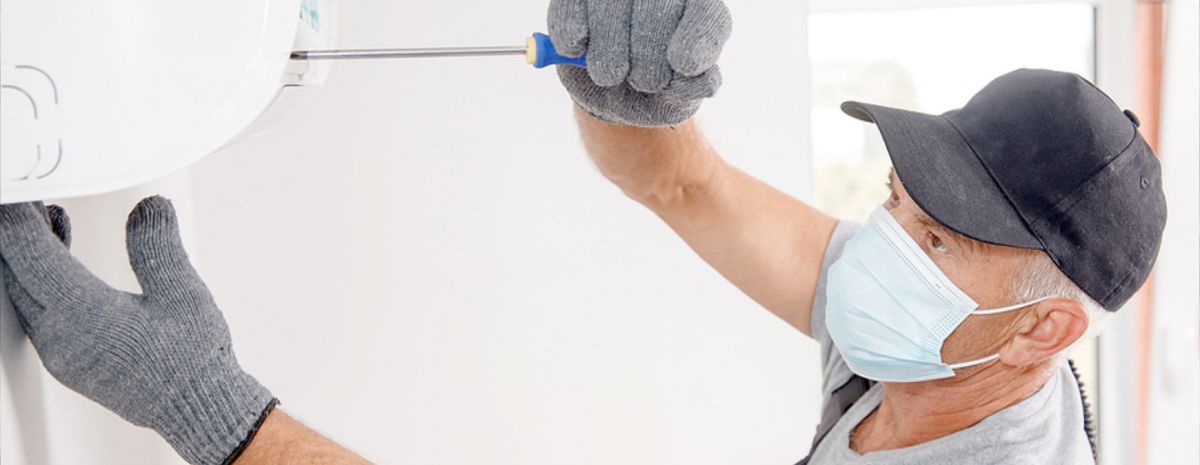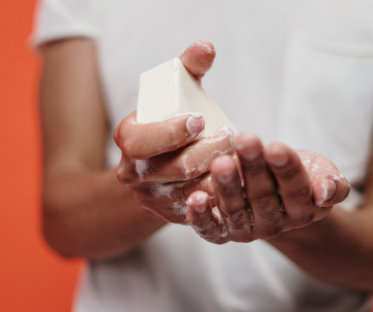
About 30 million Americans are out of work because of the coronavirus.1 But not HVAC technicians. Many are still plying their trade because people need air conditioning and refrigeration to stay healthy and comfortable, especially in hot spots like Phoenix, Arizona.2,3
The work HVAC techs do is so critical to the operation of the country and its infrastructure that the federal government deemed them “essential workers.” These tradesmen and women have a special responsibility to keep working during the pandemic.2
But, in order to supply clean, cool air to Americans’ homes and businesses, HVAC technicians need to stay healthy. And that means taking precautions during service calls to avoid contracting the virus.4
Keep reading to see what safety measures HVAC technicians across the country have been taking to stay safe on the job.4
4 Ways HVAC Techs Can Work Safer during the Pandemic
A typical day in the life of an HVAC/R tech may involve traveling to several different locations to make service calls: homes, stores, factories, hospitals and office buildings.5
Get Started on the Path to a New Career
Fill out our form to learn how we can help you change your life.
What can techs do to keep themselves and their customers safe? Many are taking safety precautions that mirror advice from the U.S. Centers for Disease Control and Prevention (CDC):6
- Washing hands frequently
- Avoiding close contact with others
- Covering mouth and nose with cloth face cover
- Cleaning and disinfecting frequently touched surfaces
- Monitoring health daily for symptoms6
Let’s take a look at how the CDC’s recommendations are being put into practice by the essential HVAC/R workforce.
1. Wearing Safety Gear
In Denton County, Texas, Ron Strelke, president of Denton HVAC and plumbing company Force Home Services, says his workers are wearing “the proper protective gear” before entering customers’ homes.7
Eddie Zeman, a plumber in the same town, does as well. Prior to each job, he puts on gloves, shoe coverings and a face mask.7
The HVAC technicians at Comfort Matters Heating & Cooling in Minneapolis took safety a step further, cutting special virus protection filters and fitting them into dual-pocketed masks.8
Corey Hickmann, the owner and founder of the company, said, “Adding a filter significantly improves the performance and effectiveness of cloth barriers in combating infections.”8
Not only did the techs at Comfort Matters make custom face masks for their team but also for the residents of local retirement homes, nursing homes and more than 1,000 homes. They even made them for employees of meat-processing plants in the area.8
Wearing protective glasses is yet another precaution HVAC technicians can take because the eyes can serve as an entry point for virus particles released when a sick person talks, coughs or sneezes.9
Whatever type of safety gear you choose to wear, it’s important to remember to properly dispose of it at the end of the day. Simply throwing old gloves and masks into your work truck could contaminate the space.9
2. Washing Hands and Sanitizing Surfaces

While in a customer’s home, workers for Force Home Services in Denton wipe down whatever they touch, whether a thermostat or other types of equipment.7
At Aire Serve in Quincy, Massachusetts, technicians use Lysol wipes on the door handles and steering wheels of their work trucks.4
Before and after each plumbing job, Eddie Zeman sanitizes his hands, in addition to wearing gloves while working.7
Frequent handwashing has become “a way of life now” for the technicians at the Electric Motor Repair Company’s five locations across the mid-Atlantic, says commercial refrigeration service supervisor Don Jones.10
3. Working at a Safe Distance
Whenever possible, the HVAC technicians at Comfort Matters practice “’hands-free’ sales and service to reduce as much contact as possible between” themselves and their customers. They’ve stopped shaking hands and taking signatures for payments. HVAC invoices are emailed. Technicians social distance at work sites with their masks on.8
4. Monitoring Health
Another precaution technicians at Force Home take is to ask customers if they are or have recently been sick before entering the home.7
At Comfort Matters, any technicians who showed signs of being sick were tested and sent home. They could only return to work once it was confirmed their results were negative for the virus.8
Train for an Essential Career as an HVAC Technician
HVAC technicians have a social responsibility to keep working during the pandemic.2 Their work is that important.
Similar to other essential workers like doctors and nurses, they’re taking precautions to keep themselves and their customers safe.11
If you’re interested in playing your part in the essential workforce, chat with a rep for The Refrigeration School today about HVAC training. Call (888) 671-5803.
Additional Sources
1https://www.nytimes.com/live/2020/07/23/business/stock-market-today-coronavirus
2https://www.cisa.gov/sites/default/files/publications/Version_3.1_CISA_Guidance_on_Essential_Critical_Infrastructure_Workers_0.pdf
3https://www.azcentral.com/story/news/local/arizona-environment/2018/09/10/heat-killed-record-number-people-phoenix-area-last-year/1149695002/
4https://wgem.com/2020/05/08/hvac-technicians-adjusting-to-covid-19-in-time-for-the-busy-season/
5https://www.bls.gov/ooh/installation-maintenance-and-repair/heating-air-conditioning-and-refrigeration-mechanics-and-installers.htm#tab-3
6https://www.cdc.gov/coronavirus/2019-ncov/prevent-getting-sick/prevention.html
7https://dentonrc.com/coronavirus_outbreak/can-you-flush-that-pandemic-leads-to-unique-travails-for-plumbers-hvac-crews/article_ecbdafef-22de-52b6-906b-a013792fd5c0.html
8https://www.contractingbusiness.com/covid-19/article/21132301/comfort-matters-serves-customers-community-during-covid-lockdowns
9https://www.achrnews.com/articles/142890-comprehensive-guide-hvac-service-calls-during-covid-19
10https://www.achrnews.com/articles/143412-refrigeration-contractors-expect-covid-19-to-bring-change
11https://www.cidrap.umn.edu/news-perspective/2020/07/pandemic-rages-ppe-supply-remains-problem
This blog has been labeled as archived as it may no longer contain the most up-to-date data. For a list of all current blog posts, please visit our blog homepage at https://www.rsi.edu/blog/

